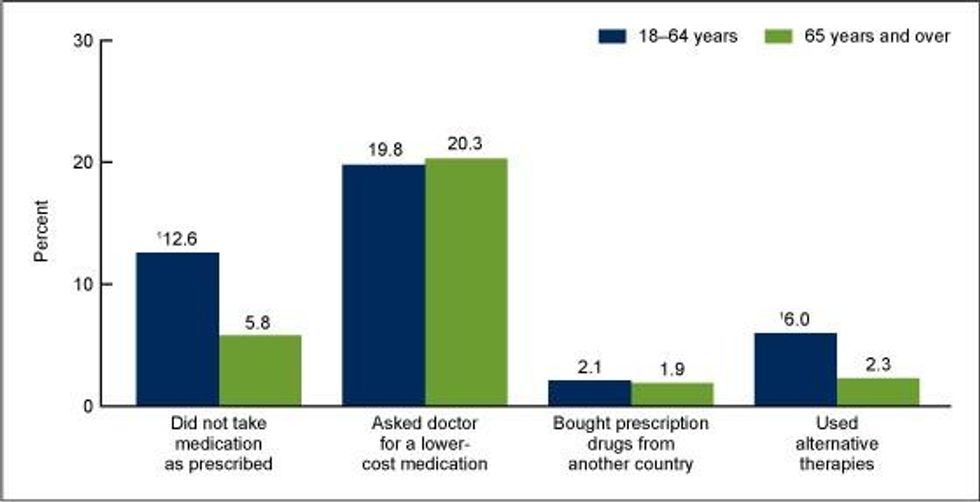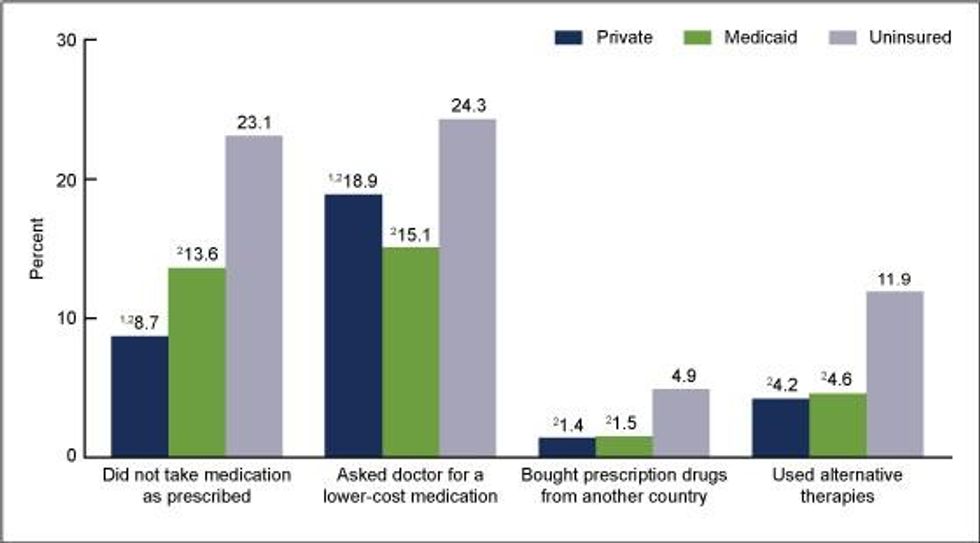

SUBSCRIBE TO OUR FREE NEWSLETTER
Daily news & progressive opinion—funded by the people, not the corporations—delivered straight to your inbox.
5
#000000
#FFFFFF
To donate by check, phone, or other method, see our More Ways to Give page.


Daily news & progressive opinion—funded by the people, not the corporations—delivered straight to your inbox.
Results from a survey out Tuesday are underscoring the repercussions lack of healthcare insurance and high drug costs have on adults in the US.
Outlining the findings from their 2011 National Health Interview Survey, the Centers for Disease Control and Prevention (CDC) state that many adults are not taking medicine as prescribed--either skipping doses, delaying prescription refills or taking less medicine--as a way to save money, which the CDC says can lead to "poorer health status and increased emergency room use, hospitalizations, and cardiovascular events."
Other cost-saving measures included patients asking their doctor for a lower cost medication or buying the prescription medicine from out of the country.


Among adults 18 - 64, 19.7% of those classified as poor did not take their medicine as prescribed in order to save money, compared to 9.6% of those in that age range classified as not poor.
__________________________
Dear Common Dreams reader, The U.S. is on a fast track to authoritarianism like nothing I've ever seen. Meanwhile, corporate news outlets are utterly capitulating to Trump, twisting their coverage to avoid drawing his ire while lining up to stuff cash in his pockets. That's why I believe that Common Dreams is doing the best and most consequential reporting that we've ever done. Our small but mighty team is a progressive reporting powerhouse, covering the news every day that the corporate media never will. Our mission has always been simple: To inform. To inspire. And to ignite change for the common good. Now here's the key piece that I want all our readers to understand: None of this would be possible without your financial support. That's not just some fundraising cliche. It's the absolute and literal truth. We don't accept corporate advertising and never will. We don't have a paywall because we don't think people should be blocked from critical news based on their ability to pay. Everything we do is funded by the donations of readers like you. Will you donate now to help power the nonprofit, independent reporting of Common Dreams? Thank you for being a vital member of our community. Together, we can keep independent journalism alive when it’s needed most. - Craig Brown, Co-founder |
Results from a survey out Tuesday are underscoring the repercussions lack of healthcare insurance and high drug costs have on adults in the US.
Outlining the findings from their 2011 National Health Interview Survey, the Centers for Disease Control and Prevention (CDC) state that many adults are not taking medicine as prescribed--either skipping doses, delaying prescription refills or taking less medicine--as a way to save money, which the CDC says can lead to "poorer health status and increased emergency room use, hospitalizations, and cardiovascular events."
Other cost-saving measures included patients asking their doctor for a lower cost medication or buying the prescription medicine from out of the country.


Among adults 18 - 64, 19.7% of those classified as poor did not take their medicine as prescribed in order to save money, compared to 9.6% of those in that age range classified as not poor.
__________________________
Results from a survey out Tuesday are underscoring the repercussions lack of healthcare insurance and high drug costs have on adults in the US.
Outlining the findings from their 2011 National Health Interview Survey, the Centers for Disease Control and Prevention (CDC) state that many adults are not taking medicine as prescribed--either skipping doses, delaying prescription refills or taking less medicine--as a way to save money, which the CDC says can lead to "poorer health status and increased emergency room use, hospitalizations, and cardiovascular events."
Other cost-saving measures included patients asking their doctor for a lower cost medication or buying the prescription medicine from out of the country.


Among adults 18 - 64, 19.7% of those classified as poor did not take their medicine as prescribed in order to save money, compared to 9.6% of those in that age range classified as not poor.
__________________________